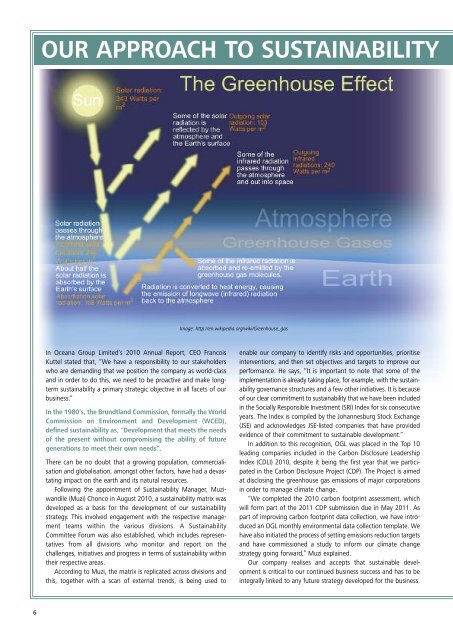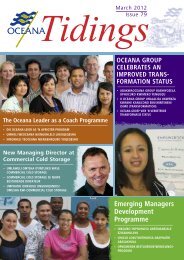April 2011 - Oceana Group
April 2011 - Oceana Group
April 2011 - Oceana Group
Create successful ePaper yourself
Turn your PDF publications into a flip-book with our unique Google optimized e-Paper software.
6<br />
OUR APPROACH TO SUSTAINABILITY<br />
In <strong>Oceana</strong> <strong>Group</strong> Limited’s 2010 Annual Report, CEO Francois<br />
Kuttel stated that, “We have a responsibility to our stakeholders<br />
who are demanding that we position the company as world-class<br />
and in order to do this, we need to be proactive and make longterm<br />
sustainability a primary strategic objective in all facets of our<br />
business.”<br />
In the 1980’s, the Brundtland Commission, formally the World<br />
Commission on Environment and Development (WCED),<br />
defined sustainability as, "Development that meets the needs<br />
of the present without compromising the ability of future<br />
generations to meet their own needs".<br />
There can be no doubt that a growing population, commercialisation<br />
and globalisation, amongst other factors, have had a devastating<br />
impact on the earth and its natural resources.<br />
Following the appointment of Sustainability Manager, Muziwandile<br />
(Muzi) Chonco in August 2010, a sustainability matrix was<br />
developed as a basis for the development of our sustainability<br />
strategy. This involved engagement with the respective management<br />
teams within the various divisions. A Sustainability<br />
Committee Forum was also established, which includes representatives<br />
from all divisions who monitor and report on the<br />
challenges, initiatives and progress in terms of sustainability within<br />
their respective areas.<br />
According to Muzi, the matrix is replicated across divisions and<br />
this, together with a scan of external trends, is being used to<br />
Image: http://en.wikipedia.org/wiki/Greenhouse_gas<br />
enable our company to identify risks and opportunities, prioritise<br />
interventions, and then set objectives and targets to improve our<br />
performance. He says, “It is important to note that some of the<br />
implementation is already taking place, for example, with the sustainability<br />
governance structures and a few other initiatives. It is because<br />
of our clear commitment to sustainability that we have been included<br />
in the Socially Responsible Investment (SRI) Index for six consecutive<br />
years. The Index is compiled by the Johannesburg Stock Exchange<br />
(JSE) and acknowledges JSE-listed companies that have provided<br />
evidence of their commitment to sustainable development.”<br />
In addition to this recognition, OGL was placed in the Top 10<br />
leading companies included in the Carbon Disclosure Leadership<br />
Index (CDLI) 2010, despite it being the first year that we participated<br />
in the Carbon Disclosure Project (CDP). The Project is aimed<br />
at disclosing the greenhouse gas emissions of major corporations<br />
in order to manage climate change.<br />
“We completed the 2010 carbon footprint assessment, which<br />
will form part of the <strong>2011</strong> CDP submission due in May <strong>2011</strong>. As<br />
part of improving carbon footprint data collection, we have introduced<br />
an OGL monthly environmental data collection template. We<br />
have also initiated the process of setting emissions reduction targets<br />
and have commissioned a study to inform our climate change<br />
strategy going forward,” Muzi explained.<br />
Our company realises and accepts that sustainable development<br />
is critical to our continued business success and has to be<br />
integrally linked to any future strategy developed for the business.



